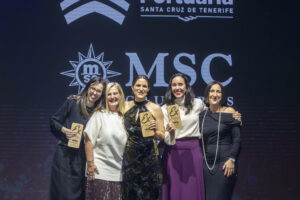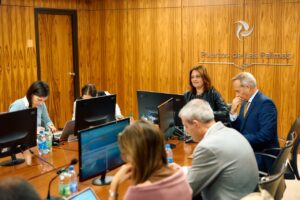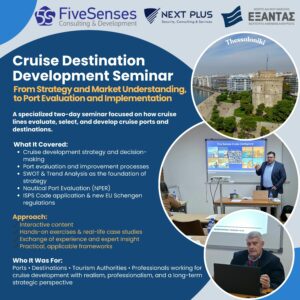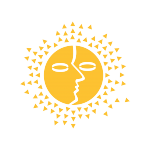On Tuesday 10th of May 2022, the 4th meeting for the Working Group on Cruises and Port Cities took place in a hybrid format, with participants meeting in Tangier and online. The Moroccan port city hosted the 17th World Conference Cities and Ports, hence providing the perfect opportunity for the members of the working group to meet physically after several virtual meetings. This initiative, launched by AIVP and MedCruise in 2021 gathers 25 members from both organizations to exchange good practices that can foster a sustainable interaction between cruises and port cities.
The meeting was chaired by Silvia Coppolino Director of the MedCruise BoD, Aimilia Papachristou, General Secretary of MedCruise and José M P Sanchez Director of Agenda AIVP 2030. The main topics this time were Resilience & Sustainability. The participants learnt from the experiences shared by:
- Mr. Stephen Xuereb, GPH COO Plc and CEO of Valetta Cruise Port Plc
- Ms. Valeria Mangiarotti, Marketing manager of Port Network Authority of the Sardinian Sea and Director of Sustainability Environmental issues MedCruise
- Mr. Jamil Ouazzani, Director of Marketing & Strategic Intelligence in Tangier City Port Management Company and Director of EcoSystem and Sustainability
- Mr. Ioannis Pappas, Director Mediterranean Region of Global Sustainable Tourism Council (GSTC).
Mr. Xuereb, representing GPH – The world’s largest cruise port operator, explained how their company faced the pandemic, in which cruise activities came to halt. In that period, GPH made massive investment in their terminals to improve the facilities and develop health and safety protocols. This was exemplified with three practical case, Valetta, Nassau and Antigua. These investments will have a long-term positive impact, due to the more modern facilities that will reduce the environmental impact of cruises and provide new public spaces both for tourists and locals.
Ms. Mangiarotti’s intervention explored the issue of sustainable cruises focusing on environmental solutions. In her intervention, she provided us with an overview, going from the European regulatory framework, the goals connected to the green deal and Fit-for-55 policy package to the concrete technical solutions that are currently being explored in several ports, particularly related to the energy transition. These technical solutions, from alternative fuels for ships such as hydrogen or LNG to onshore power supply (OPS) should help the sector to contribute to the global goal of reducing the carbon footprint by 55% until 2030, compared to the levels of 1990. However, the new technologies also present challenges, from technical questions to the business models. These challenges will have to be overcome to be develop sustainable cruises and respond to societal demands.
Mr. Ouazzani addressed another key issue for the protection of the oceans, plastic pollution, presenting the Plastic Smart Cities in Tangier, developed in cooperation with the environmental NGO WWF. In his pitch, he explained several key aspects of this key initiative, from the planning and dialogue with the different stakeholders to the engagement with the local population, guaranteeing social support. In this project, the interaction with schools was one of the main actions, inviting groups of children to discover the initiative at the Tanha Marina Bay international, with a clear educational purpose. The Plastic Smart Cities in Tangier is also an excellent example of the importance of controlling the complete communication process, and engaging key actors.
Finally, Dr. Pappas, explained the destination assessment process of Heraklion, to obtain the recognition of the Global Sustainable Tourism Council. Once again, the engagement of the stakeholders was one of the main pillars of this initiatives, including the port authority, the Municipality, public and private organizations, as well as the local society and NGOs. The process included several workshops and meetings with all these stakeholders but also a thorough assessment of sustainable development aspects, based on 174 indicators, identified by GSTC. The assessment is completed with a recommendation of specific projects.
The 4th meeting concluded with questions from the colleagues participating in the meeting, showing particularly interest in assessment methodologies for port cities as cruise destinations, as an important tool to improve the integration of cruise activities in cities and define specific sustainability strategies that respond to the local demands.
The following meeting in July, will focus on community building a topic transversal to previous discussions. From both organizations we invite the members to present their projects and share the good practices with other colleagues. This time, we will return to virtual platforms




